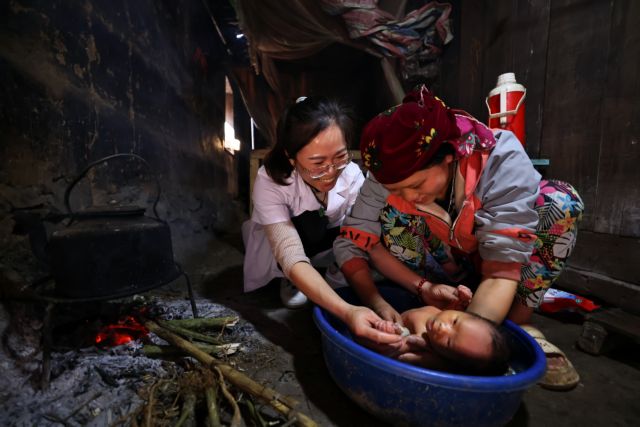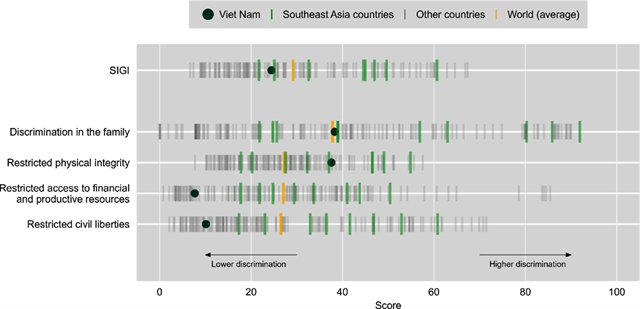 Society
Society


|
| A doctor guides an ethnic minority woman in taking care of her newborn baby in the northern mountainous province of Hà Giang. — VNA/VNS Photo Minh Đức |
HÀ NỘI — Gender-based discrimination in Vietnamese social institutions was rated at low levels, lower than the Southeast Asian and world averages, according to the recent report from OECD’s Social Institutions and Gender Index (SIGI).
The report, which measures the state of gender equality, assesses 179 countries and territories based on the level of gender-based discrimination in their social institutions. Discrimination in social institutions encompass both formal and informal laws, as well as social norms and practices that restrict women’s and girls’ access to rights, justice, empowerment opportunities and resources, thereby undermining their agency and authority.
According to the "SIGI 2024 Regional Report for Southeast Asia: Time to Care," in 2023, Việt Nam obtained a SIGI score of 24, denoting low levels of discrimination, compared to an average score of 39 in Southeast Asia and 37 across Asia, denoting medium levels of discrimination, and a world average score of 29.2 (low)
The country obtained a score of 38 in the “Discrimination in the family” and “Restrictive physical integrity” dimensions, followed by “Restricted civil liberties” (10) and “Restricted access to productive and financial resources” (8).
In the report, it has been highlighted that Việt Nam's Constitution plays a crucial role in promoting gender equality by recognising and prohibiting various forms of discrimination. Article 16 of the Constitution specifically emphasises the equality of all citizens before the law, explicitly forbidding discrimination based on an individual's political, civic, economic, cultural or social background.
The Constitution of Việt Nam takes a strong stance against sex-based discrimination, as articulated in Article 26, and ensures equal opportunities in employment by prohibiting discrimination, as stated in Article 35.
The country also adopted the Convention on the Elimination of All Forms of Discrimination Against Women (CEDAW) in 1982.
Việt Nam has recently passed the National Action Programme on Women, Peace, and Security for the 2024-30 period, with various specific objectives -- including enhancing the meaningful and equal participation of Vietnamese women in key areas such as politics, diplomacy, national defence, security, and addressing and responding to the nation's non-traditional security challenges, as well as contributing to the preservation of international peace and security.

|
| SIGI and dimension scores for Việt Nam, 2023. Scores range from 0 to 100, with 0 indicating no discrimination and 100 indicating absolute discrimination. The Southeast Asia region covers Brunei Darussalam, Cambodia, Indonesia, Lao PDR, Malaysia, Myanmar, the Philippines, Singapore, Thailand, Timor-Leste and Việt Nam. |
While the legal framework guarantees equality of the sexes in almost all aspects of life, the report also pointed out that in practice, "persisting social norms and informal laws undermine this de jure equality –particularly regarding women’s role and responsibilities at home and in the labour market."
For example, 78 per cent of the population think that children suffer when their mother works for pay and 52 per cent think that men should have priority to jobs when those are scarce, which indicates the public perceptions attached to a woman's identity, and helps reinforce traditional gender roles.
Ingrained discriminatory beliefs also pose a threat to the bodily autonomy of women. A concerning statistic reveals that more than half of Vietnamese women (57 per cent) condone the use of physical violence by men against their spouses in specific situations.
Additionally, the report said that given notable disparity in the boy-to-girl ratio within the country, there might be the presence of sex-selective practices.
In ASEAN, only Cambodia boasts lower score indicating less gender-based discrimination than Việt Nam. Thailand has medium level of discrimination, while the level in Indonesia, Singapore, Myanmar, and Philippines was rated as high. Malaysia is the only country with the SIGI score above 50 in ASEAN - with 61, it is rated as having very high level of discrimination.
Data for Brunei and Timor Leste were not available. — VNS




